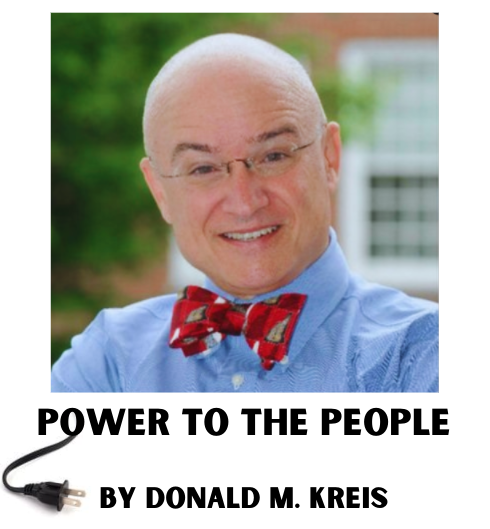Power to the People is a column by D. Maurice Kreis, New Hampshire’s Consumer Advocate. Kreis and his staff of four represent the interests of residential utility customers before the NH Public Utilities Commission and elsewhere.
By DONALD M. KREIS, Power to the People
New Hampshire doesn’t care about who owns its public utilities. But maybe it should.
In one sense, this indifference is reasonable. The parent companies of the state’s electric and natural gas utilities are all publicly traded.
That means you can buy or sell shares of Eversource, Algonquin Power & Utilities (parent of Liberty), or Unitil (which, I recently learned, is the smallest utility on the New York Stock Exchange) to your heart’s content. That’s entirely your business.
But at some point, an investor can acquire enough shares to demand a seat at the table, often literally via representation on the board, and thus palpably affect the fate of the company, its other shareholders, and, of course, its customers. But even in that instance, New Hampshire is pretty indifferent.
We have a statute – RSA 374:33 – that says you need approval from the Public Utilities Commission to acquire more than ten percent of a utility’s stock, but only if you are already a public utility.
That’s why it is of no concern to New Hampshire regulators that, according to page 32 of the annual proxy statement of Eversource Energy, The Vanguard Group of Malvern, Pennsylvania is the beneficial owner of 12.13 percent of Eversource – and Black Rock, Inc. of New York City owns 11.5 percent. A third company – State Street Corporation – holds 6.4 percent of Eversource’s shares.
Somebody cares about that stuff, however. He’s Mark C. Christie, the last member of the Federal Energy Regulatory Commission (FERC) to have been nominated by President Trump.
On April 19, Commissioner Christie issued a concurring opinion in a FERC docket renewing Black Rock’s authorization to own shares of public utilities in unlimited quantities. Unlike New Hampshire law, federal law cares about this stuff.
Christie concurred rather than dissented because he said the FERC action on April 19 was “consistent with past practices and precedents of this commission dating back for many years.” But, as they say, shots were fired.
Specifically, he quoted with approval a pleading submitted by the nonprofit advocacy organization Public Citizen, which argued:
In less than a generation, investment managers like BlackRock have come to dominate the financing [of] the architecture of the U.S. economy, as management funds control over $11 trillion in the U.S., exceeding the value of so-called active funds for the first time in history. Just three companies?BlackRock, Vanguard and State Street?together control 82% of all assets flowing into all investment funds (both active and passive) over the last decade, and command as much as 80% of the global ETF market. While often erroneously described as “passive”, in actuality they influence and control corporate governance and decision-making.
Did you catch that? Public Citizen and Commissioner Christie named the three entities that also happen to comprise the three largest shareholders of New Hampshire’s biggest utility, Eversource (or to be more precise, Eversource as the parent company of the state’s biggest utility, Public Service Company of New Hampshire (PSNH), which is doing business these days as “Eversource”).
To Public Citizen’s comments – which, by the way, are italicized above as Commissioner Christie chose to italicize them – Christie added:
The claim that huge asset managers such as BlackRock, State Street and Vanguard are merely passive investors in publicly held corporations, investing purely for the benefit of their beneficiaries ? many of whom are retirees receiving pensions ? is no longer credible. BlackRock, in particular, has been openly aggressive in using its massive financial power to influence corporate policy in areas far attenuated from the legitimate money-management goals of protecting the incomes and investment interests of its beneficiaries.
Christie is spot-on when he observed: “The central issue is whether these asset managers use their huge financial power to promote the interests of their beneficiaries or the political and ideological beliefs of their owners and top managers. You can also be legitimately concerned whether any small group of asset managers should wield this degree of financial power for these ends.”
Here in New Hampshire, you don’t have to be a background-lurking major shareholder like BlackRock to evade regulatory scrutiny. Consider that just before Eversource was formed in 2012, via the merger of Boston’s big utility (NSTAR) and the Connecticut-based Northeast Utilities (then the parent of PSNH), the PUC concluded it had no jurisdiction over the merger.
Does anybody seriously think that New Hampshire utility customers are better off today under Eversource than the were under the much smaller Northeast Utilities? New Hampshire is now the oddball stepchild of the Eversource empire, with the revolving door of its local executives constantly spinning toward the exits as the key decisions are made in Boston.
Random factoid: Of the six Eversource executives who earned the highest compensation in 2021 (according to the company’s Form 10-K for 2021 as filed with the federal Securities and Exchange Commission), I personally have met precisely none of them. They’re all based out of state.
Second random factoid: According to the same page of that Form 10-K, Eversource’s Executive Chairman, James J. Judge, received $10,220,941 in compensation last year. As he earns his lavish pay, who does the executive chairman think about more – BlackRock, which owns about 11 percent of Eversource’s shares, or New Hampshire ratepayers, who fork over almost exactly the same percentage of the company’s revenues?
I have no idea. As I said, I’ve never met the guy.





